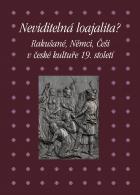
Neviditelná loajalita. Rakušané, Němci, Češi v české kultuře 19. století [ Unvisible Loyalty. The Astrians, Germans and Czechs in the Czech Culture of 19th Century]. Prague, Academia 2016, 355 pp., bw and color images, index, summary. ISBN 978-80-200-2562-3. Editors Václav Petrbok, Taťána Petrasová, and Pavla Machalíková.
exhibition

Exhibition ‘Risk of Loyalty. Austrian, German and Czech Cultural Identities in 19th Century Visual Art, Westbohemian Gallery, Pilsen, February–April 2016
Text and concept: Taťána Petrasová and Markéta Theinhardt
Cultural Loyalties as a Methodological Question
In its general meaning loyalty is understood as a phenomenon which allows society to exist in a given way. THe editors of the compilation Treue. Politishce Loyalität und militärische Gefolgschaft in der Moderne (Fidelity. Political Loyalty and Military Obedience in the Modern Age) decided to study loyalty in its narrower sense, as a faithful relationship based on an oath. They were led by the attitudes of the German public, who perceived the role of fidelity negativly with regar to its abuse during the building of a collective identity and mobilization in the 19th and 20th centuries. The autors of the exhibition titled Risk of Loylaty. Austrian, German and Czech Cultural Identities in 19th Century Visual Art were inspired by this approach for two reasons. One reson is because Czech society often perceives a devoted relationship as a probematic national feature. It was also valid for the Czech elites – and not only in the 19th century – that officials, soldiers, and even state employees, and among them artists, entered into a pact of loyalty, i.e. servitude of a kind, with the state authority. The authors of the exhibition study the concept of national art as a type of certain loyalty.
